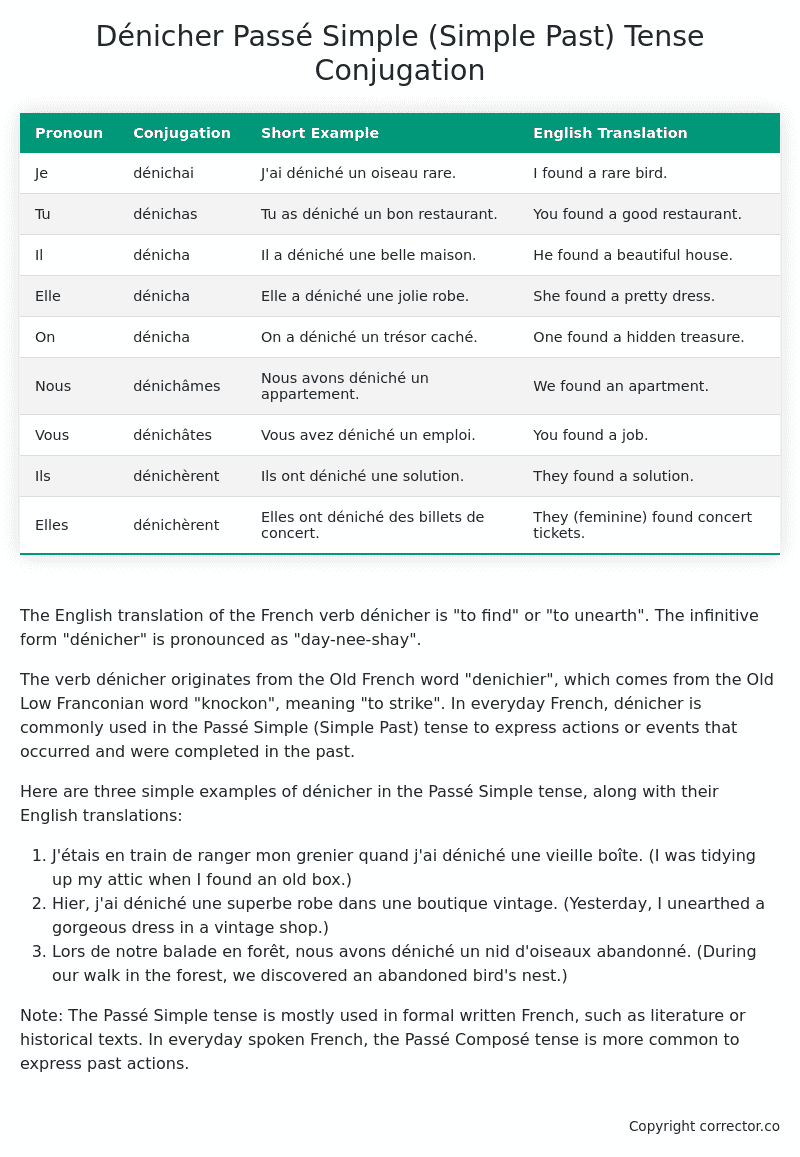Passé Simple (Simple Past) Tense Conjugation of the French Verb dénicher
Introduction to the verb dénicher
The English translation of the French verb dénicher is “to find” or “to unearth”. The infinitive form “dénicher” is pronounced as “day-nee-shay”.
The verb dénicher originates from the Old French word “denichier”, which comes from the Old Low Franconian word “knockon”, meaning “to strike”. In everyday French, dénicher is commonly used in the Passé Simple (Simple Past) tense to express actions or events that occurred and were completed in the past.
Here are three simple examples of dénicher in the Passé Simple tense, along with their English translations:
- J’étais en train de ranger mon grenier quand j’ai déniché une vieille boîte. (I was tidying up my attic when I found an old box.)
- Hier, j’ai déniché une superbe robe dans une boutique vintage. (Yesterday, I unearthed a gorgeous dress in a vintage shop.)
- Lors de notre balade en forêt, nous avons déniché un nid d’oiseaux abandonné. (During our walk in the forest, we discovered an abandoned bird’s nest.)
Note: The Passé Simple tense is mostly used in formal written French, such as literature or historical texts. In everyday spoken French, the Passé Composé tense is more common to express past actions.
Table of the Passé Simple (Simple Past) Tense Conjugation of dénicher
| Pronoun | Conjugation | Short Example | English Translation |
|---|---|---|---|
| Je | dénichai | J’ai déniché un oiseau rare. | I found a rare bird. |
| Tu | dénichas | Tu as déniché un bon restaurant. | You found a good restaurant. |
| Il | dénicha | Il a déniché une belle maison. | He found a beautiful house. |
| Elle | dénicha | Elle a déniché une jolie robe. | She found a pretty dress. |
| On | dénicha | On a déniché un trésor caché. | One found a hidden treasure. |
| Nous | dénichâmes | Nous avons déniché un appartement. | We found an apartment. |
| Vous | dénichâtes | Vous avez déniché un emploi. | You found a job. |
| Ils | dénichèrent | Ils ont déniché une solution. | They found a solution. |
| Elles | dénichèrent | Elles ont déniché des billets de concert. | They (feminine) found concert tickets. |
Other Conjugations for Dénicher.
Le Present (Present Tense) Conjugation of the French Verb dénicher
Imparfait (Imperfect) Tense Conjugation of the French Verb dénicher
Passé Simple (Simple Past) Tense Conjugation of the French Verb dénicher (You’re reading it right now!)
Passé Composé (Present Perfect) Tense Conjugation of the French Verb dénicher
Futur Simple (Simple Future) Tense Conjugation of the French Verb dénicher
Futur Proche (Near Future) Tense Conjugation of the French Verb dénicher
Plus-que-parfait (Pluperfect) Tense Conjugation of the French Verb dénicher
Passé Antérieur (Past Anterior) Tense Conjugation of the French Verb dénicher
Futur Antérieur (Future Anterior) Tense Conjugation of the French Verb dénicher
Subjonctif Présent (Subjunctive Present) Tense Conjugation of the French Verb dénicher
Subjonctif Passé (Subjunctive Past) Tense Conjugation of the French Verb dénicher
Subjonctif Imparfait (Subjunctive Imperfect) Tense Conjugation of the French Verb dénicher
Subjonctif Plus-que-parfait (Subjunctive Pluperfect) Tense Conjugation of the French Verb dénicher
Conditionnel Présent (Conditional Present) Tense Conjugation of the French Verb dénicher
Conditionnel Passé (Conditional Past) Tense Conjugation of the French Verb dénicher
Conditionnel Passé II (Conditional Past II) Tense Conjugation of the French Verb dénicher
L’impératif Présent (Imperative Present) Tense Conjugation of the French Verb dénicher
L’impératif Passé (Imperative Past) Tense Conjugation of the French Verb dénicher
L’infinitif Présent (Infinitive Present) Tense Conjugation of the French Verb dénicher
L’infinitif Passé (Infinitive Past) Tense Conjugation of the French Verb dénicher
Le Participe Présent (Present Participle) Tense Conjugation of the French Verb dénicher
Le Participe Passé (Past Participle) Tense Conjugation of the French Verb dénicher
Struggling with French verbs or the language in general? Why not use our free French Grammar Checker – no registration required!
Get a FREE Download Study Sheet of this Conjugation 🔥
Simply right click the image below, click “save image” and get your free reference for the dénicher Passé Simple tense conjugation!

Dénicher – About the French Passé Simple (Simple Past) Tense
Formation
Usage
Narration
Historical Context
Interactions with other tenses
Passé Composé
Imparfait
Conditional and Subjunctive
Summary
I hope you enjoyed this article on the verb dénicher. Still in a learning mood? Check out another TOTALLY random French verb conjugation!


